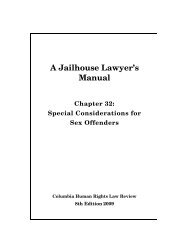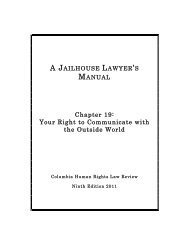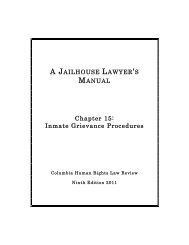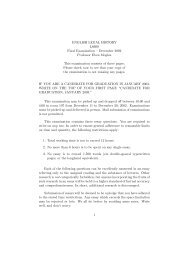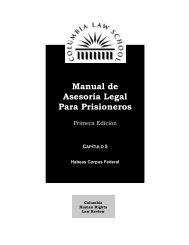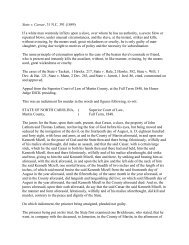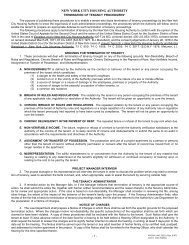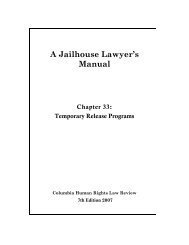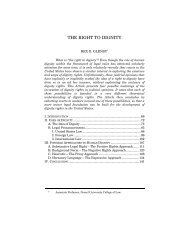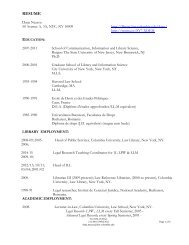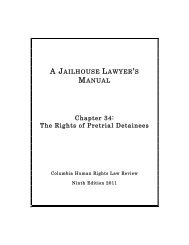A Right to Media? Lorie M. Graham - Columbia Law School
A Right to Media? Lorie M. Graham - Columbia Law School
A Right to Media? Lorie M. Graham - Columbia Law School
You also want an ePaper? Increase the reach of your titles
YUMPU automatically turns print PDFs into web optimized ePapers that Google loves.
2010] A RIGHT TO MEDIA? 467<br />
presented by a variety of media outlets. Sometimes also called<br />
“community media,” the notion of media pluralism embraces the<br />
concept of local content media, which is controlled by community<br />
stakeholders. It presents information focused on issues of interest <strong>to</strong><br />
the community in a format and language which best reflects the<br />
cultural values and concerns of the local community. The promotion<br />
of media pluralism has been connected <strong>to</strong> other important aims such<br />
as combating ethnic cleansing, addressing incitement <strong>to</strong> violence<br />
against various groups, and undermining <strong>to</strong>talitarian regimes. The<br />
value of media pluralism lies in the inherently democratic nature of<br />
dispersing the power <strong>to</strong> “make news” in<strong>to</strong> the hands of many. 138<br />
The connection between a right <strong>to</strong> media under Article 16 of<br />
UNDRIP and the movement for media pluralism is clear. In order for<br />
a state <strong>to</strong> satisfy its obligations under international law, it must<br />
foster freedom of expression and media diversity for all of its peoples.<br />
The state’s obligation <strong>to</strong> ensure media pluralism is articulated in<br />
provisions such as Article 2 of the ICCPR which calls on parties <strong>to</strong><br />
“adopt such legislative or other measures as may be necessary <strong>to</strong> give<br />
effect <strong>to</strong> the rights recognized by the Covenant.” 139 This means that<br />
the state is required not only <strong>to</strong> refrain from interfering with rights,<br />
but also that it must take positive steps <strong>to</strong> ensure that these rights,<br />
including freedom of expression, are respected.<br />
Regional bodies such as the European Court of Human<br />
<strong>Right</strong>s have similarly noted that “the fundamental role of freedom of<br />
expression in a democratic society, in particular where, through the<br />
press, it serves <strong>to</strong> impart information and ideas of general<br />
138. For discussions of media pluralism, see id. (explaining UNESCO’s<br />
high prioritization of the free flow of information and freedom of expression);<br />
Office of the High Comm’r on National Minorities, Org. for Sec. & Cooperation in<br />
Eur., Guidelines on the Use of Minority Languages in the Broadcast <strong>Media</strong> 16, 19<br />
(2003), available at http://www.osce.org/publications/hcnm/2003/10/31598<br />
_1160_en.pdf (discussing the particular attention that must be afforded <strong>to</strong> the<br />
promotion of media pluralism); UNESCO General Conference, Paris, France, Oct.<br />
21–Nov. 12, 1997, Records of the General Conference, Vol. 1 Resolutions, Sofia<br />
Declaration at 63 (recalling the importance of free, pluralistic, and independent<br />
press and resolutions <strong>to</strong> encourage press freedom, independent and pluralistic<br />
media, and dissemination of information); UNESCO Seminar on Press Freedom,<br />
<strong>Media</strong> Independence, and Pluralism, Windhoek, Namib., May 3, 1991, Windhoek<br />
Declaration, para. 1, available at http://www.unesco.org/webworld/peace_library<br />
/UNESCO/HRIGHTS/327-331.HTM (recalling that freedom of information is a<br />
fundamental human right and declaring the importance of independent,<br />
pluralistic, and free press).<br />
139. ICCPR, supra note 36, art. 2.



